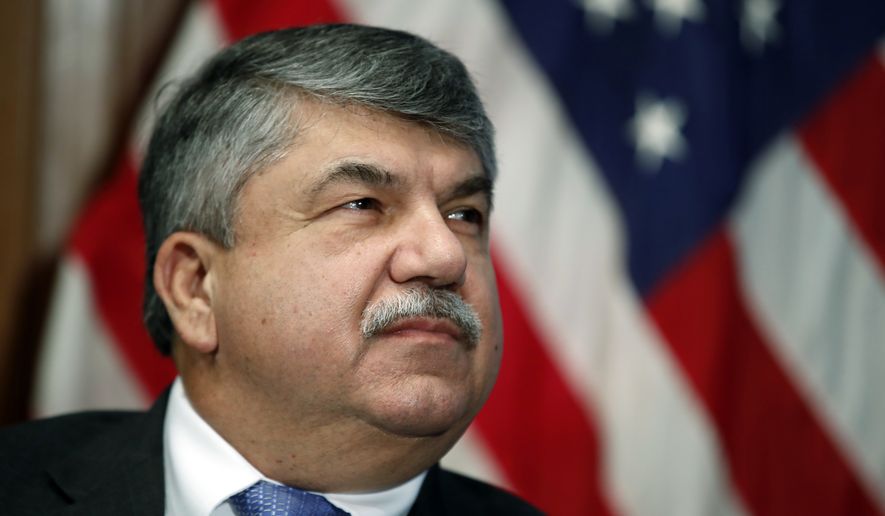Richard Trumka, president of the powerful AFL-CIO labor federation and a close ally of President Biden, died Thursday at age 72.
Mr. Trumka rose from the coal mines of Pennsylvania to lead the labor organization’s 12.5 million members for more than a decade. Those close to him said he was with family members when he suffered a heart attack while celebrating his grandson’s birthday.
Mr. Biden, who learned of the death just before holding an event at the White House, called Mr. Trumka “a close personal friend” and said he was “more than the head of the AFL-CIO.” The president was visibly saddened.
Majority Leader Charles E. Schumer, New York Democrat, took to the Senate floor to announce Mr. Trumka‘s death. “The working people of America have lost a fierce warrior at a time when we needed him most,” Mr. Schumer told the chamber with tears in his eyes.
Mr. Trumka had been AFL-CIO president since 2009, after serving as secretary-treasurer for 14 years. He oversaw a federation with more than 12.5 million members and ushered in a more aggressive leadership style.
“The labor movement, the AFL-CIO and the nation lost a legend today,” the AFL-CIO said. “Rich Trumka devoted his life to working people, from his early days as president of the United Mine Workers of America to his unparalleled leadership as the voice of America’s labor movement.”
PHOTOS: Celebrity deaths in 2021: The famous faces we've lost
Sen. Joe Manchin III, West Virginia Democrat, said he was “heartbroken” and called Mr. Trumka “a dear friend.”
“Rich’s story is the American story. He was the son and grandson of Italian and Polish immigrants, and began his career mining coal,” Mr. Manchin said. “He dedicated the rest of his career to fighting for America’s working men and women. He was a fierce advocate for working people and a truly decent man.”
A burly man with thick eyebrows and a bushy mustache, Mr. Trumka was the son and grandson of coal miners. He grew up in the small southwestern Pennsylvania town of Nemacolin. He worked as a coal miner while attending Penn State University.
He was tough and combative, a throwback to an old guard of union leaders from the labor movement’s heyday. But he rose in a distinctly different era, as trade union membership declined and labor’s political power dwindled. He often focused on making a case for unions to the White working class, which turned away from Democrats.
He met with President Trump but called him a “fraud” who had deceived the working class.
Mr. Trump shot back by calling Mr. Trumka ineffectual. “No wonder unions are losing so much,” Mr. Trump tweeted.
Mr. Trumka also at times challenged blue-collar workers to confront their own racism. During Sen. Barack Obama’s first winning campaign for the White House, Mr. Trumka denounced racism in the union ranks.
“We can’t tap dance around the fact that there’s a lot of White folks out there … and a lot of them are good union people. They just can’t get past this idea that there’s something wrong with voting for a Black man,” he said during an impassioned 2008 speech in which he exhorted them to vote for Mr. Obama.
Until his sudden death, he used his power to push for health care legislation, expanded workers rights and infrastructure spending.
He was a leading proponent for a public, government-run health insurance option, and he threatened Democrats who opposed such a plan.
“We need to be a labor movement that stands by our friends, punishes its enemies and challenges those who, well, can’t seem to decide which side they’re on,” he said.
During the 2011 debate over public employee union rights in Republican-controlled statehouses, Mr. Trumka said the angry protests were overdue.
He said he hoped Wisconsin Gov. Scott Walker’s bill to strip public employee unions of their bargaining power could renew support for unions after decades of decline. The move drew thousands of protesters to the Capitol in Madison.
Whether he meant to or not, Mr. Trumka said, Mr. Walker started a national debate about collective bargaining “that this country sorely needed to have.”
On Thursday, eulogies poured in from Mr. Trumka’s Democratic allies in Washington.
“Richard Trumka dedicated his life to the labor movement and the right to organize,” House Speaker Nancy Pelosi, California Democrat, said in a statement. “Richard’s leadership transcended a single movement, as he fought with principle and persistence to defend the dignity of every person.”
Lee Saunders, president of the American Federation of State, County and Municipal Employees, called Mr. Trumka “one of the nation’s fiercest, most effective advocates for working people ever.”
“From workplace safety to racial justice to retirement security to labor law reform and so much more, Rich has never relented in the struggle to ensure that working people are able to have lives of dignity and security,” he said. “Today, I say a prayer for my friend. Tomorrow, I fight in his memory.”
• This article is based in part on wire service reports.
• Dave Boyer can be reached at dboyer@washingtontimes.com.




Please read our comment policy before commenting.